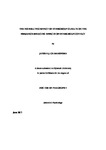The Moderating Effect of Intergroup Climate on the Prejudice-Reducing Effects of Intergroup Contact
| dc.contributor.supervisor | Wyer, Natalie | |
| dc.contributor.author | Charlesford, Jaysan J | |
| dc.contributor.other | Faculty of Health | en_US |
| dc.date.accessioned | 2017-08-04T14:31:36Z | |
| dc.date.issued | 2017 | |
| dc.identifier | 755844 | en_US |
| dc.identifier.uri | http://hdl.handle.net/10026.1/9670 | |
| dc.description.abstract |
Drawing upon intergroup contact theory (Allport, 1954; Pettigrew 1998) and the emerging literature on intergroup climate (e.g., Christ et al., 2013, 2014), I utilised various antipathetic intergroup relationships (e.g., Black people vs. White people; non-Muslims vs. Muslims), and various models of contact (e.g., Pettigrew, 1998; Koschate & van Dick, 2011) to test whether the effect of higher quality contact on less prejudice was facilitated by perceptions of a more positive intergroup climate. Results supported Allport’s (1954) classic model of four contact conditions independently predicting prejudice, although the conditions of ‘equal status’, ‘goal interdependence’, and ‘cooperation’ loaded strongly onto a separate factor than did ‘authority support’. Intergroup climate was successfully modelled as perceptions of intergroup norms, ingroup norms, and sociohistoric norms; further, there was some indication that beliefs regarding authority – traditionally considered a contact condition – might also impact intergroup climate in the form of macro authority norms. Results further supported the position that individuals are sensitive to intergroup climate, perceptions of which exhibited a separate – and stronger – effect on outgroup attitudes than did quality of personal contact. Regarding the proposed moderating effect of intergroup climate on contact effects, results were equivocal across studies. Some results supported the prediction of a facilitating effect of warmer ingroup norms on stronger contact effects. However, analyses of cross-sectional data revealed some evidence for an inhibitory effect, such that more negative (vs. positive) perceptions of intergroup climate were associated with a stronger relation between higher quality contact and warmer outgroup attitudes. Therefore, some aspects of intergroup contact might be most effective in negative intergroup climates. Theoretical and practical implications for contact researchers, prejudice researchers, and practitioners, are discussed. | en_US |
| dc.language.iso | en | |
| dc.publisher | University of Plymouth | |
| dc.subject | prejudice | en_US |
| dc.subject | intergroup contact | en_US |
| dc.subject | intergroup climate | en_US |
| dc.subject.classification | PhD | en_US |
| dc.title | The Moderating Effect of Intergroup Climate on the Prejudice-Reducing Effects of Intergroup Contact | en_US |
| dc.type | Thesis | |
| plymouth.version | publishable | en_US |
| dc.identifier.doi | http://dx.doi.org/10.24382/962 | |
| dc.rights.embargodate | 2018-08-04T14:31:36Z | |
| dc.rights.embargoperiod | 12 months | en_US |
| dc.type.qualification | Doctorate | en_US |
| rioxxterms.version | NA | |
| plymouth.orcid_id | 158238976 | en_US |
Files in this item
This item appears in the following Collection(s)
-
01 Research Theses Main Collection
Research Theses Main


